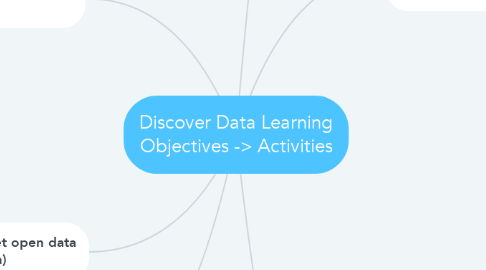
1. Describe commonly used data terms and concepts (knowledge)
1.1. What is data? Unstructured/structured, classifications, etc.
1.2. Super cool data facts
1.3. Why the urgency to change how we work with data?
1.3.1. IoT, 5G, increase in digital activity and availability of data, developments in AI
1.3.2. Canada's Data Strategy Roadmap
1.3.3. Maintaining legitimacy and public trust
1.3.4. Protecting citizens from the misuse of their data and the adverse effects of technology
2. Identify and Discuss behaviours related to healthy data culture and data ethics (comprehension)
2.1. Common data roles
2.1.1. Data governance
2.1.2. Data stewardship
2.1.3. Analytics
2.1.4. Analytics consumer
2.1.5. Data provisioner/owner
2.1.6. Front line
2.1.7. business/policy analyst
2.2. Principles of data ethics / data ethics in the GC
2.3. Data sharing (open by default?)
2.4. Have participants take databilities or other self assessment??
2.5. Defining a business problem / determination of data sources
2.6. Data quality
2.6.1. Importance of quality - How does data flow through an org (use example of a dataset used many times through a big org - ESDC??)
2.7. Use of statistics
2.7.1. how to know when something has statistical significance
2.8. Data driven decision making
2.9. Presenting data to decision-makers / storytelling
2.9.1. *Check out CSPS courses on briefing notes / 2 minute briefings. Overlap?
2.10. Use of available tools
2.10.1. visualization software
2.10.2. SQL
2.10.3. R/python
2.10.4. relational database systems
2.11. How to read a data model (from Sandy K)
2.11.1. Provides the structural framework for a database, how datasets relate to each other
3. Explain data as a government asset (knowledge)
3.1. What are the opportunities?
3.1.1. Platform government
3.1.2. Single window/single sign-on service delivery
3.1.3. Accessible, shared, quality data across departments, OGD
3.1.4. Open data put to use by academia/private sector
3.2. What are the challenges?
3.2.1. Infrastructure / legacy systems
3.2.2. data literacy / recruitment
3.2.3. privacy / public trust / public license / legal restrictions
3.2.4. Accountability (addressing siloed government programs on shared platforms)
3.3. How to create value from data
3.3.1. Include use cases: wins/art of the possible and cautionary tales
4. Locate and interpret open data sources (application)
4.1. open.canada.ca
4.2. Statscan
4.3. other?
4.4. activity around data scavenger hunt (find open data source)
5. Describe the GC digital infrastructure and give examples of where departmental data assets are located (Comprehension)
5.1. Touch on cloud and data lake/warehouse possibilities with Cloud
6. Explain what Reference Data management is and the 6 GC standards ( TBD)
6.1. What is reference data?
6.1.1. Unique Identifiers
6.1.2. Status codes
6.1.3. Attributes
6.1.4. Anything in a drop down menu
6.1.5. Lookup tables
6.1.6. Categories
6.1.7. Shared by multiple systems within or outside org (units of measure, country codes, etc.)
6.1.8. Categorizes the org's transactions
6.1.9. Each piece of rd has a distinct definition
6.1.10. Can universal, industry or organization specific
6.2. Why is reference data important?
6.2.1. Data quality and integrity
6.2.2. reporting and analytics
6.2.3. Data integration (mapping between systems)
6.2.4. Standards (enforcing common standards, mapping standards across systems)
6.2.5. Inventory (managing hierarchies and lists)
